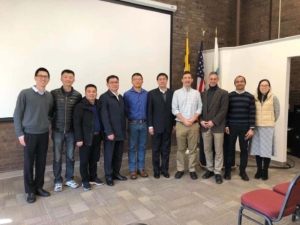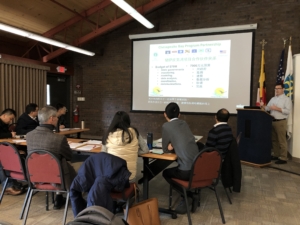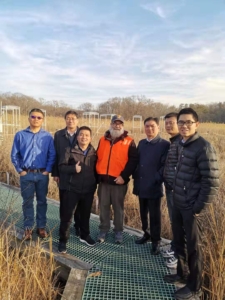 The Chesapeake Research Consortium (CRC) recently hosted a group of environmental professionals managing the Chaohu Lake in Anhui Province, China. CRC director Denice Wardrop and former director Bill Ball welcomed the visitors to a mini-workshop/symposium on the Smithsonian Environmental Research Center (SERC) campus, where the CRC is located. The SERC campus served as an excellent site for this information exchange between the delegation and scientists from the U.S. EPA Chesapeake Bay Program Office (CBPO).
The Chesapeake Research Consortium (CRC) recently hosted a group of environmental professionals managing the Chaohu Lake in Anhui Province, China. CRC director Denice Wardrop and former director Bill Ball welcomed the visitors to a mini-workshop/symposium on the Smithsonian Environmental Research Center (SERC) campus, where the CRC is located. The SERC campus served as an excellent site for this information exchange between the delegation and scientists from the U.S. EPA Chesapeake Bay Program Office (CBPO).
The Chaohu Lake is the fifth largest freshwater lake in China. Due to rapid economic growth in its watershed, the Chaohu Lake has become one of China’s most polluted and experienced severe issues of eutrophication and silting. Consequently, the restoration of Chaohu Lake has become a top priority of the local and provincial governments.
 The main purpose of the Chaohu Lake delegates’ visit to the Chesapeake Bay was to better understand how the Chesapeake Bay restoration has been planned and implemented. Toward that end, liaisons Drs. Jian Peng and Qian Zhang worked together to develop an agenda for this visit.
The main purpose of the Chaohu Lake delegates’ visit to the Chesapeake Bay was to better understand how the Chesapeake Bay restoration has been planned and implemented. Toward that end, liaisons Drs. Jian Peng and Qian Zhang worked together to develop an agenda for this visit.
The Chinese visitors at the workshop included Gao Binyou (Director General of the Hefei Municipal Government’s Office of Lake Chaohu Water Prevention and Control), Neng-Sheng Wu (Chief Engineer of the Lake Ecological Research Institute of Anhui and representative of the Provincial Chao Lake Management Authority), and several other scientists working on the Chaohu project. Representatives from the EPA Chesapeake Bay Program Office included Gary Shenk, Gopal Bhatt, Peter Tango, Cuiyin Wu, and Qian Zhang. During the meeting, Shenk, Bhatt, and Tango shared knowledge and experiences in Chesapeake Bay restoration and the partnership’s modeling system, the partnership’s airshed model, and the partnership’s long-term  monitoring program, respectively. Zhang and Wu provided translation and technical clarifications. The visitors were impressed by the level of effort that has been invested in Chesapeake Bay monitoring, modeling, and research and expressed interest in potential future collaborations.
monitoring program, respectively. Zhang and Wu provided translation and technical clarifications. The visitors were impressed by the level of effort that has been invested in Chesapeake Bay monitoring, modeling, and research and expressed interest in potential future collaborations.
With planning assistance from SERC PI Patrick Megonigal and project description and logistical field assistance from Andrew Peresta, the Chaohu Lake visitors finished their experience with a visit to SERC’s world renowned Global Change Research Wetland to witness several long-term experiments designed to understand the responses of coastal marshes to global environmental change.
